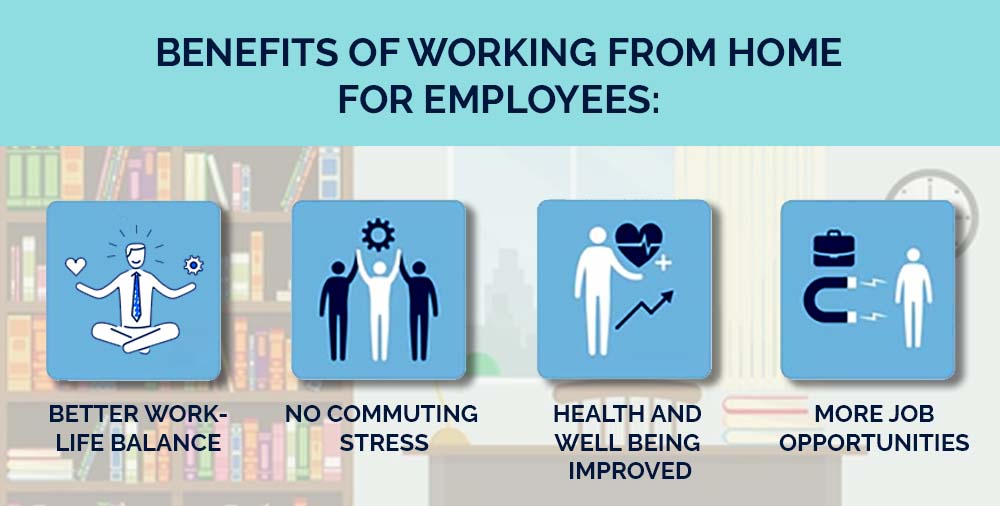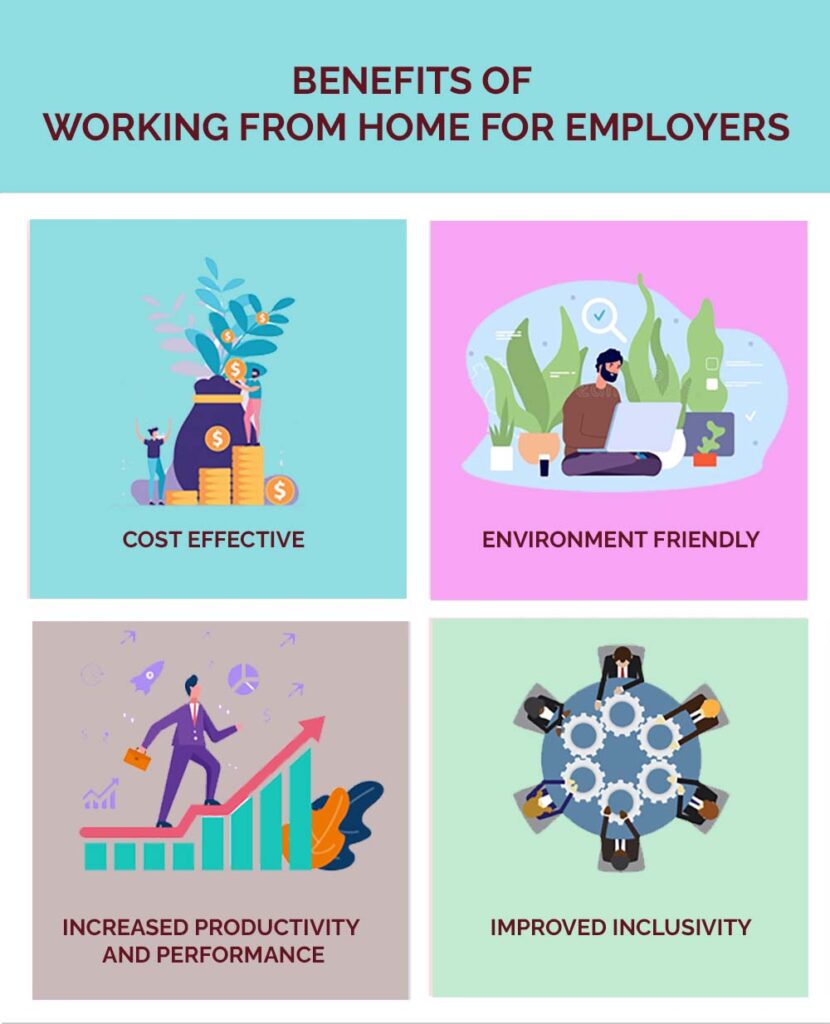I have been enjoying my work from home stint since the outbreak of the pandemic. Working in pyjamas and t-shirts, and sipping tea give you a sense of easiness and comfort. This is the most comfortable dressing code for work, according to me! By breaking the barrier of 9-to-5 working hours, I feel a lot more accomplished. I have heard about the common benefits of working remotely (and yes, I am now experiencing them!). After working for more than a year now from home, I believe flexible work is the future of work. With companies all over the world asking their employees to work from home, remote work has become the new normal for businesses and employers. Some of the benefits of working from home for employers and employees can include improved wellbeing and lower costs.
‘‘
Retaining top talent, staying competitive in their field, and even saving on business costs are some of the few added advantages employers are witnessing with the work from home benefit.
However, working from home doesn’t mean you are on your own. In fact, you tend to contribute more hours, when working from home. Many progressive companies are now letting their employees work from home. They are preferring to hire freelancers, digital experts, and others, who don’t need office and mostly prefer working from home. One of the major advantages of working from home is you can save a lot of time and money on commuting from home to office and vice versa. In metros, this is a real time burner, where you waste your maximum time jammed in the traffic.
Working remotely not only allows increased flexibility but also autonomy for employees. Nine out of 10 workers, who are currently working remotely, plan to do the same for the rest of their careers. With supporting technologies such as videoconferencing software, collaboration platforms, and cloud services, people are now connected 24X7. This is allowing them to have meetings and complete projects from anywhere, anytime. But it is not just employees who benefit, employers are starting to view remote work as an important part of hiring. Retaining top talent, staying competitive in their field, and even saving on business costs are some of the few added advantages employers are witnessing with the work from home benefit.
Globally, working from home was not the new concept. With the ability to work from anywhere, anytime, remote work was a full-on global work movement even before the Covid-19 pandemic. But now this pandemic has forced millions to work from their homes. In the year 2018, over 50 per cent of the US workforce was showcased to be working remotely. Not just the US, Europe’s remote workers have also surged from 7.7 per cent to 9.8 per cent in the past decade. By providing the flexibility to work when and where, companies can give big advantages to their employees. But for India, working from home is surely a new trend after the coronavirus pandemic. Before the lockdown, it was mostly IT companies, which used to allow their employees flexible working. But now everyone is jumping into this to make work from home possible.

Now after witnessing remote working for over a year, there are a host of advantages for employees as well as for employers. Let’s list out the best benefits of remote working or work from home for both.
Better Work-Life Balance:
For many businesses, few years ago, working remotely would have been nearly impossible. With the absence of the right technology, an employee had to go to the office to get its work done. And there was a downside to all these. There was a blurred line between work and home life. Maintaining a healthy work-life balance is top of mind for many employees. The ability to balance these two worlds has become the key to feeling happier and more productive while at work. Saving time that would otherwise be spent on a long commute allows employees to have better work-life balance and adds hours back into their daily lives. There are many things that can be taken carried off with this. Whether it is dropping kids off at school, running some daily errands, attending an online fitness class in the morning, or managing kids and old ones, these tasks and more are all easier to balance when you work from home.
No Commuting Stress:
The average daily commuting time in India to office is 180 minutes, this includes the daily traffic. Imagine spending 3 hours commuting daily to your workplace, and it really adds up. Cutting out a commute can be both a huge morale booster and a huge time saver. Employees will also waste less money on petrol, gas, diesel or public transportation. This fatigue adds to various diseases and increases level of stress and anxiety. Commuting 10 miles to work every day is associated with health issues like higher cholesterol, elevated blood sugar, and increased risk of depression. Avoiding the commute to office helps you support your mental and physical health. The time saved will allow you to focus on other priorities outside the office work. This can include extra sleep in the morning, spending more time with the family, getting in a workout, or eating a healthy breakfast.
Location Independence:
Working from home also gives you an access to a broader range of job opportunities. These opportunities are not limited by geographic location and gives you a chance to work from anywhere, and any time. Also, this can be a boon to people who are staying in small towns and cities and are deprived of such opportunities. Work from home will give them a good prospect and better salary. Having no set job location means that fully remote workers could also travel and live as digital nomads, while having a meaningful career. People, who are bound to move frequently, such as military or government spouses, can also benefit from having a remote job that can be done from anywhere. This way, they will not have to start over from the scratch with each move.
Promotes Wellbeing:
With no commuting, and no long hours in the office away from family or friends, working remotely can improve the health and wellness of employees by reducing stress. Working in isolation limits exposure to potentially sick co-workers. However, employers shouldn’t skip a wellness plan in the remote workplace. Time to time, they should promote wellness programs such as access to the gym or zumba classes. Wellness program is important for both the work from home and work from office employees. On the same time, you can also pursue other activities or hobbies and improve personal relationships, among other things.
As per a survey, 72 per cent of employers say remote work has a high impact on employee retention. This means employees stay longer with their employers when they have remote work options. Not only this, working from home can also help you to lead better healthy life in various ways. You get ample time for physical activities. You automatically switch to healthier food. You are now less prone to illnesses. Working remotely can give employees the time and environment needed to make healthy choices.
‘‘
With supporting technologies such as videoconferencing software, collaboration platforms, and cloud services, people are now connected 24X7.
Money Savings:
Of course, you will see an immediate difference in your bank account when you don’t need to bear the costs of commuting. You will also find savings in other areas such as gas, car maintenance, transportation, parking fees, a professional wardrobe, lunches or snacks, and more. These money now you can save and put back in your account. You won’t have to force yourself into a suit and polished shoes anymore if that’s not your style. You don’t have to maintain a separate wardrobe for work. Similarly, it is a win-win situation for both employers and employees. With work from home being the option, employers don’t have to rent out an office. No overhead cost, and transit subsidies. As per analytics, a normal company can save over $11,000 per annum for each employee, who works from home at least for some time. Companies should consider this as a long-term solution.
Better Initiative for Environment:
Imagine if more and more people start working from home at least half time a year than the greenhouse gas emissions will be reduced automatically. There was a news last year that people in Punjab can clearly see the Himalayan mountain range. This was visible from more than 100 miles away due to the reduction in air pollution caused by the country’s coronavirus lockdown. With consumption of less paper, air condition, microwave, and lighting, remote working has potential to improve air quality.
Increased Productivity and Performance:
The ability for employers to trust their teams, even when they work out of the office, could be the key to driving more productivity than ever before. Data shows that when employees are able to skip the extra coffee breaks, a long commute, and any other distractions to focus on their work, productivity reigns supreme. A two-year remote work productivity study showed, the researchers followed 500 employees after dividing them into ‘remote’ and ‘traditional’ working groups. The remote working group results not only showed a work productivity boost equal to a full day’s work, but also fewer sick days and a 50 per cent decrease in employee attrition. Working from home leads to fewer interruptions, less office politics, a quieter noise level, and less (or more efficient) meetings. Due to lack of commuting, remote workers typically have more time and fewer distractions. This is resulted to increased productivity due to a huge benefit of working from home for both employees and employers alike.

Improved Inclusivity:
Remote work enables companies to embrace diversity and inclusion by hiring people from different socioeconomic, geographic, and cultural backgrounds and with different perspectives. This can be challenging to accomplish when recruiting is restricted to a specific locale that not everyone wants, or can afford, to live near. With allowing work from home, companies choose to support diversity, community, and family. Remote work gives people steady employment at an onsite job, like those with disabilities or caregivers who need a flexible schedule. This is by providing the opportunity to follow their career goals without worrying about commuting back and forth to an office. It also gives employees the flexibility to get to doctor’s and other healthcare appointments when needed.




